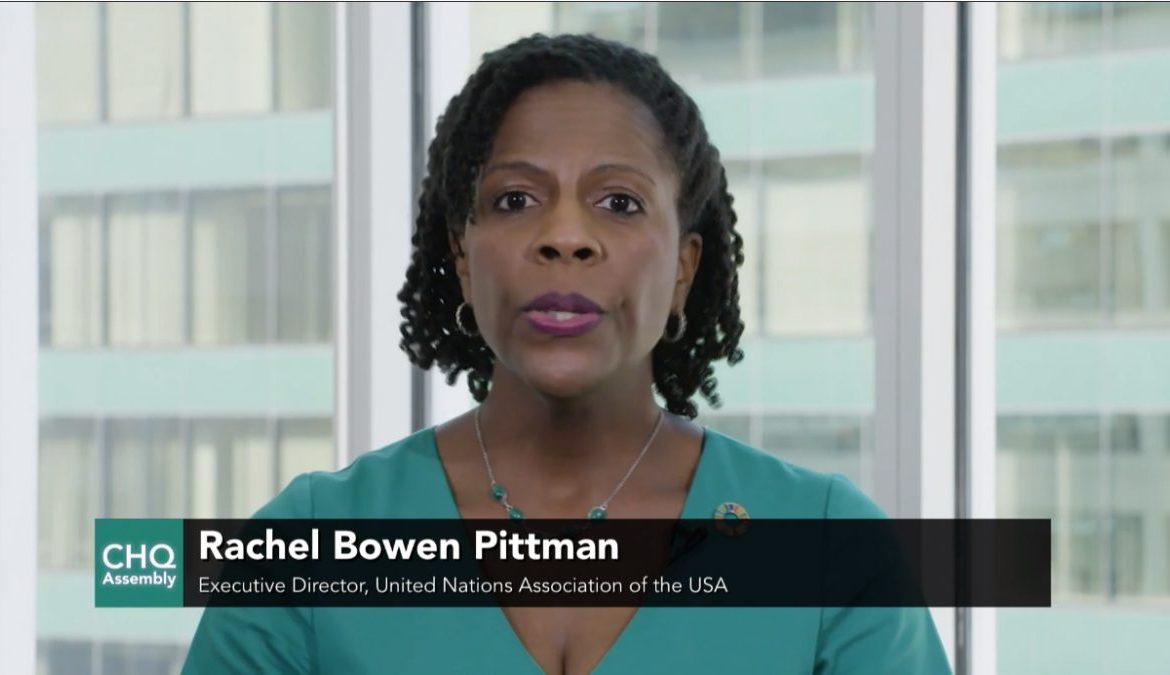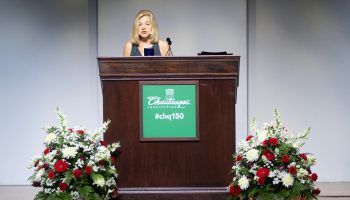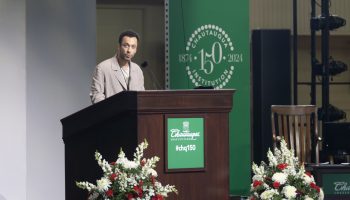Rachel Bowen Pittman grew up in a segregated Memphis, Tennessee. At age 15, she attended a National Conference of Christians and Jews summer camp, which encouraged children to interact with other cultures and taught them how to reduce prejudice and be leaders in social justice. The second day, the counselors placed the campers into different groups based on their race, and gave different rules to each group. For example, white campers got special food, and Black campers were tasked with clean-up duty.
“As teenagers, we know we have to respect and listen to adults. We knew we wanted to rebel, but we’re afraid of the consequences,” said Pittman, executive director of the United Nations Association of the United States of America. “However, after some time, one camper stood up and crossed the line into another group to break the rule. And then one by one, we all stood up until we were united as one in protest against the counselors.”
This was a planned exercise by the counselors; the goal was to teach the campers they had collective power, and sometimes building a better world requires breaking some rules.
Pittman spoke at 10:45 a.m. EDT Wednesday, Aug. 26, on the CHQ Assembly Video Platform, as part of Chautauqua Institution’s Week Nine Lecture platform, “The Future We Want — The World We Need: Collective Action For Tomorrow’s Challenges,” programmed in partnership with the U.N. Foundation. Her lecture, “Americans’ Role in Addressing Global Problems at a Local Level,” discussed what the United Nations is doing for its 75th anniversary, the effects COVID-19 has had on the globe, and actions each person can take to create a better world.
No step is too small, no movement forward will go unappreciated. Our path to a better world is real,” Pittman said.
The U.N. predicts that 71 million people will be pushed into extreme poverty due to the COVID-19 pandemic by the end of 2020. Pittman said 270 million people could face acute food insecurity — more than double the number of 2019 — meaning their lives would be in immediate danger from lack of food.
“It is clear that the COVID-19 pandemic is not the great equalizer,” Pittman said. “It, in fact, has a disproportionate effect on the most vulnerable and marginalized communities.”
She also said by the end of 2020, the U.N. predicts global greenhouse gas emissions will decline by 6 percent. This decline, however, will not keep global warming below 1.5 degrees Celsius, which Pittman said would require world emissions to fall by 7.6% every year.
Pittman discussed her work with UNA-USA, dedicated to inspiring Americans to support the work of the United Nations, and how she helps members of UNA-USA tell their stories in Congress. According to the UNA-USA website, the organization has over 20,000 members and more than 200 chapters across the country. Members can participate in monthly national conference calls with U.N. experts and have a forum to voice their support for U.S. engagement at the U.N.
“Before the pandemic, I saw this framework in action by (UNA-USA) members,” Pittman said. “I escorted younger and older members around the halls of Congress, so they could advocate for full U.S. funding for the U.N. … Many of them had never taken this action before.”
Pittman said the audience needs to think about how they will participate in the global COVID-19 recovery. She said people of any age can become involved in community engagement and activism, as well as write letters about important issues to their local paper. People can also reach out to their elected officials to make sure they are endorsing laws and practices that promote equity.
“No step is too small, no movement forward will go unappreciated. Our path to a better world is real,” Pittman said.
The lecture then shifted to a Q-and-A session with Emily Morris, Chautauqua Institution vice president of marketing and communications and chief brand officer. The UNA-USA website states that 60% of their members are under the age of 26, and Morris asked how that affects Pittman’s work.
“We felt that the voice of youth needed to be heard more,” Pittman said, “and we noticed that youth in general were becoming more engaged in advocacy issues, such as climate change and gender equality, so it was a natural move for us to want to engage more youth.”
She said UNA-USA reaches out to young people in several ways, including Model U.N. programs.
Morris asked what UNA-USA would be focusing on in the next few months.
UNA-USA holds the Global Engagement Online Series — webinars featuring a variety of experts in global issues. The next one, on Sept. 9, will be about how COVID-19 is impacting the educational systems in the U.S. and abroad, especially with the start of the academic year.
And for the 75th anniversary of the U.N., UNA-USA chapters across the country are hosting virtual programs.
“We are always looking for people to advocate for the United Nations and the work of the United Nations — especially the World Health Organization,” Pittman said. “We need to fight the COVID pandemic.”





